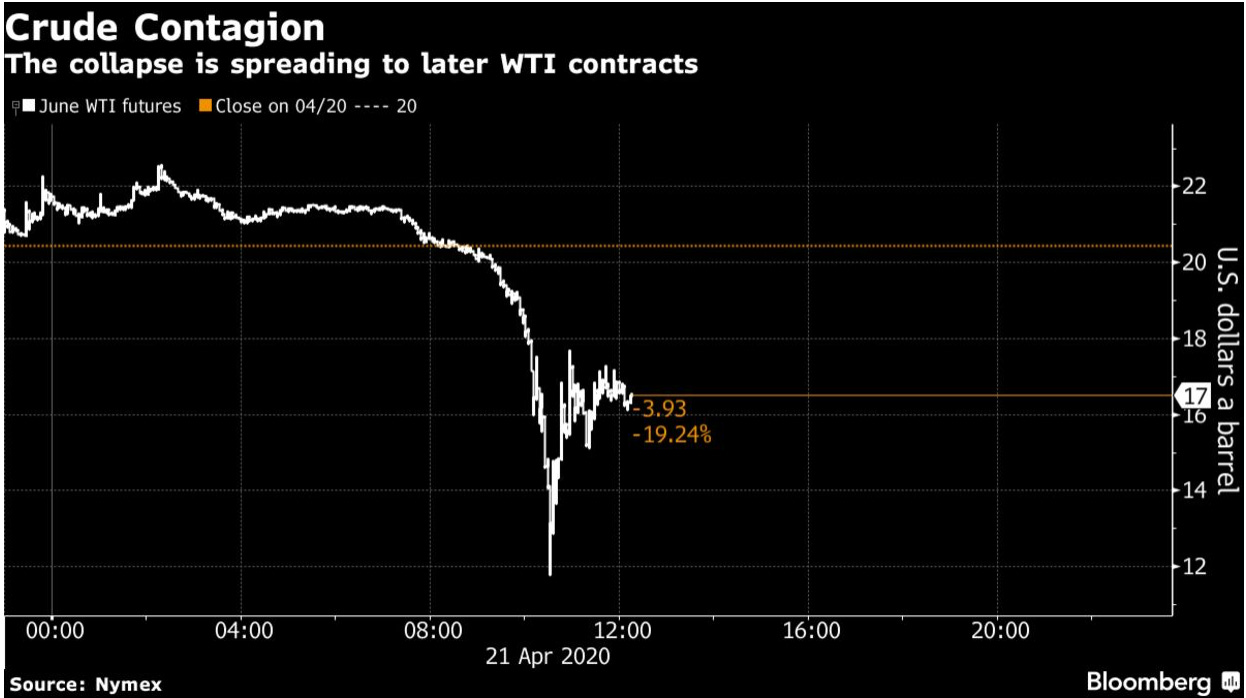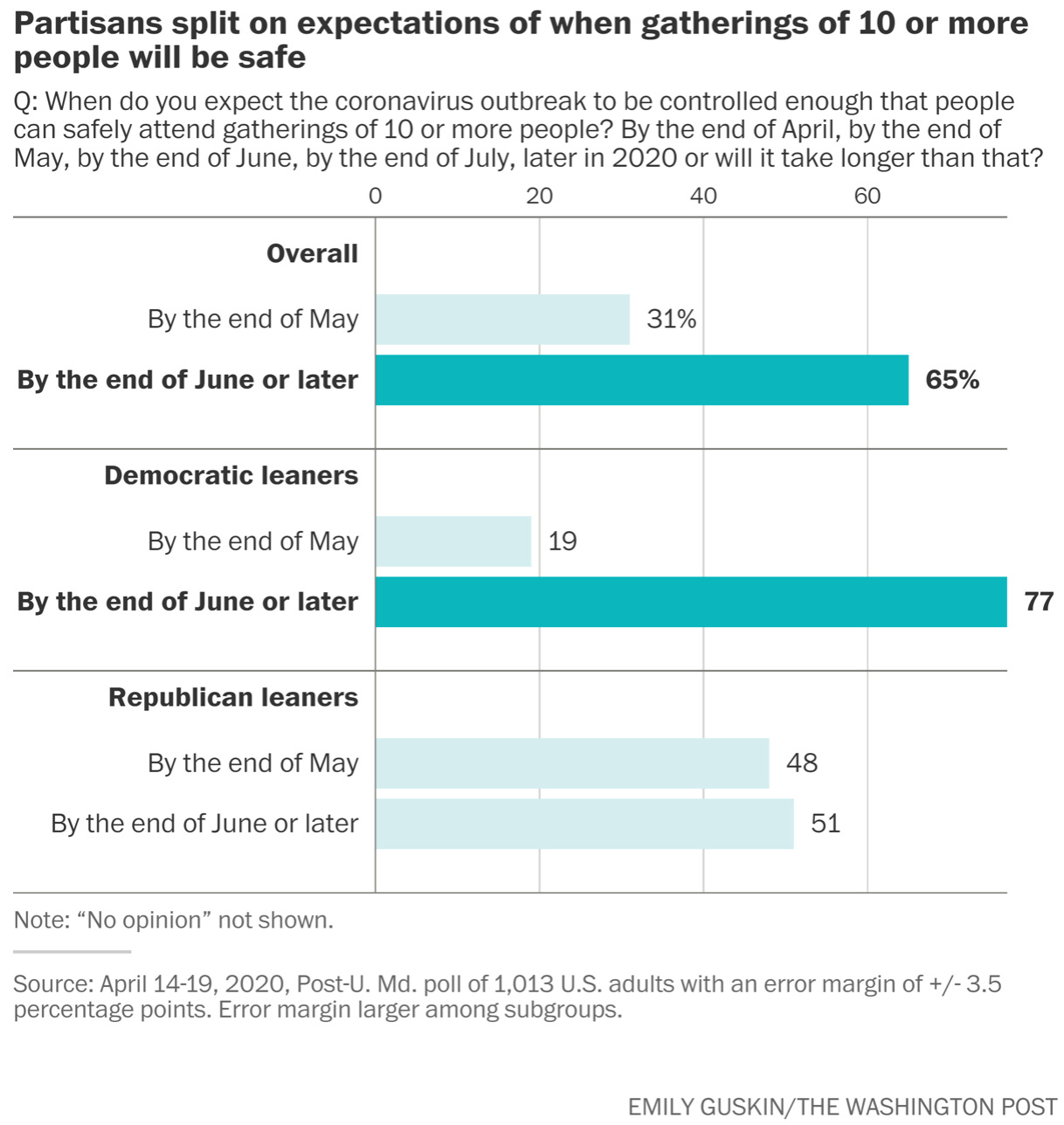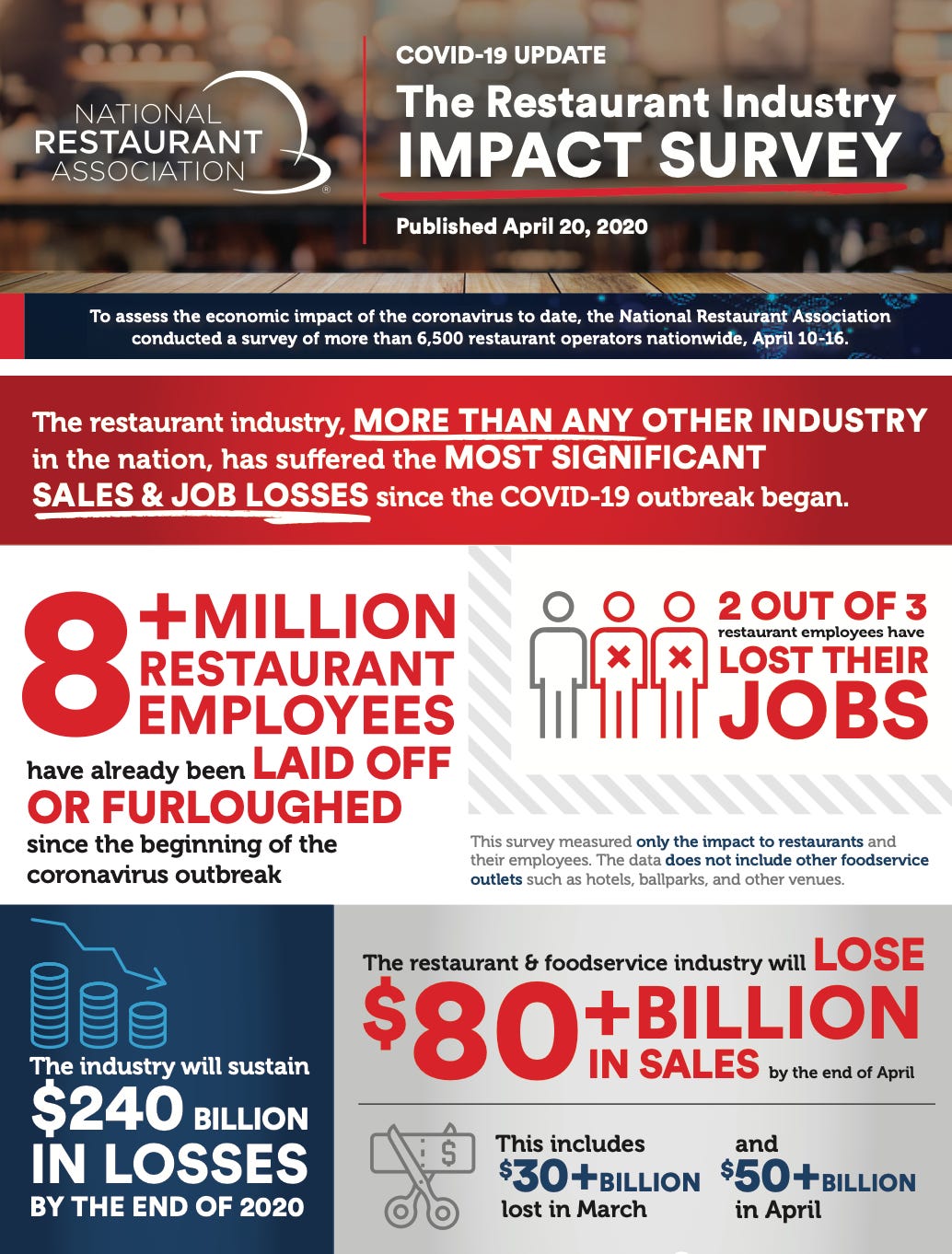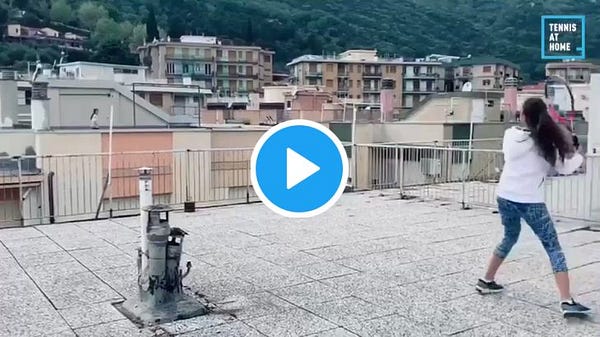Headliners:
Please forward. Sending this to 5 people you think would like it is the best way to help me get the word out. Thank you.
Please sign up for a paid subscription. During this two-week trial, you get the Founding Member Rate — 50% off the regular cost. Continued thanks to everyone who already has done so!
Reminder: Register here for my live online event, this Thursday, April 23 @ 7:30 pm ET: Front Row at the Trump Show: A Conversation with ABC News’ Jonathan Karl.
The World
Oil continued its unprecedented sell-off on Tuesday, as June futures drop 30%. West Texas Intermediate’s June contract was halted three times early in New York to manage the volatility, CME Group Inc. said, highlighting the massive glut in the market causing the rout rather than any technical quirk.
U.S. oil futures plunged below zero for the first time Monday. The historic low price reflects uncertainty about what buyers would even do with a barrel of crude in the near term. Refineries, storage facilities, pipelines and even ocean tankers have filled up rapidly since billions of people around the world began sheltering in place to slow the spread of the deadly coronavirus. (Bloomberg, CNBC, Wall Street Journal)

Sen. Chuck Schumer said he believes the Senate will pass an additional relief bill for small businesses later in the day. If the Senate succeeds in passing the legislation Tuesday the House would vote on it as early as Thursday, Majority Leader Steny H. Hoyer (D-Md.) told lawmakers. He said the House would also take the opportunity to vote on a rules change , essentially allowing lawmakers to vote from afar in the future by designating colleagues to cast votes for them. Republicans have said they will insist on a roll-call vote in the House, which will require a majority of lawmakers to be present. (CNBC, Washington Post)
Small businesses that received aid under the federal government’s $350 billion rescue program weren’t always the ones with the greatest needs or the best chances to survive the coronavirus pandemic. Whether a firm made the cut often came down to how and where it banked. Some recipients were publicly traded companies that already had significant loans with big banks. Others were customers of community banks that had long made loans through the Small Business Administration. Thousands more that lacked the right ties weren’t approved. (Wall Street Journal)
The Education Department says just $6 million of $6.28 billion in emergency aid for college students — less than 1 percent — has reached campuses so far. (Politico)
President Trump announced a plan to halt immigration to the United States. He justified the drastic move as a necessary step to protect American workers from foreign competition once the nation’s economy begins to recover from the shutdown caused by the coronavirus outbreak. (New York Times)
U.S. intelligence indicates that North Korean dictator Kim Jong Un recently had cardiovascular surgery, NBC News reported, citing American officials. Some intelligence officials said the intelligence suggest that Kim could be incapacitated, NBC added.
Meanwhile, the South Korean won weakened on Tuesday against the dollar on the unconfirmed reports from North Korea. (CNBC)
The reports shine light on North Korea’s rumour mill. In a coma, recovering from heart surgery, or barely ill at all: listen to the media and any one of these could describe the North Korean leader’s state. And the conflicting claims say much about the gaps in the outside world’s attempts to understand the hermit kingdom. (South China Morning Post)
Most Americans expect no immediate easing of the health risks associated with the coronavirus pandemic, despite calls by President Trump and others to begin reopening the economy quickly.
Most Americans — 54 percent — give the president negative marks for his handling of the outbreak in this country and offer mixed reviews for the federal government as a whole.
By contrast, 72 percent of Americans give positive ratings to the governors of their states for the way they have dealt with the crisis, with workers also rating their employers positively. And like so much else these days, it’s partisan. (Washington Post-University of Maryland poll)

67% of voters support mail-in ballots for the November elections, while 58% of voters in the survey said they favor changing election laws permanently to allow voting by mail. (Wall Street Journal/NBC News poll)
Senior White House and Trump administration officials are planning to launch a sweeping effort in the coming days to repeal or suspend federal regulations affecting businesses. The initiative is expected to center on suspending federal regulations for small businesses and expanding an existing administration program that requires agencies to revoke two regulations for every new one they issue, the two people said. While the plan remains in flux, changes could affect environmental policy, labor policy, workplace safety and health care, among other areas. (Washington Post)
To prevent a food crisis, a group of nearly 50 governments is preparing to sign a pledge aimed at ensuring supply chains remain orderly and that officials exercise restraint with any trade restrictions. The initiative is critical, according to the group -- which includes the European Union, Canada, Japan and Brazil -- because the threat of successive export bans aimed at protecting domestic food production could lead to soaring prices and shortages. As of Tuesday afternoon, the U.S., China, India and Russia had not signed on to the initiative. (Bloomberg)
Blue and White Party head Benny Gantz might have just given his political arch-rival Prime Minister Benjamin Netanyahu a life-line when it comes to diplomatic legacy and the Israeli-Palestinian conflict. The deal between the two men on Monday night didn’t just end the 17 months of electoral turmoil, during which Israel endured a historic, never-before-seen cycle of three back-to-back elections. It has also possibly saved the Trump administration’s peace deal, by rescuing Netanyahu from what was shaping up to be a suicidal choice between the Israeli Right or the US President. (Jerusalem Post)
China is becoming increasingly assertive in the region as the coronavirus crisis eases on the mainland while raging elsewhere in the world, with a crackdown in Hong Kong and sabre-rattling around Taiwan and in the South China Sea. (Reuters)
Prime Minister Justin Trudeau promised Monday that his government would strengthen gun control legislation once Parliament reconvenes. During his reelection campaign last year, Trudeau pledged to ban all military-style assault rifles if he was voted back into office. (Huffington Post)
U.S. airlines face a bleak future of depressed traffic and volatile revenue well into 2021. Airlines are barred from slashing jobs through Sept. 30 under the terms of a $50 billion government bailout, but they’re already warning employees that cuts are almost inevitable. Bailout interest rate for US airlines is as low as 1%. (Bloomberg, Financial Times)
Meanwhile, Emirates will have vacant seats in between individual passengers or family groups and won’t allow cabin baggage on flights as the airline seeks to contain the spread of the coronavirus (Bloomberg)
Empty resorts spell long crisis for Caribbean: The World Tourism Organization (UNWTO), a U.N. body dedicated to promoting the industry, last month forecast a 20% to 30% plunge in arrivals this year. The Caribbean Development Bank went further, forecasting a 50% slump if restrictions continue until September and a 100% fall if the policies stay in place all year. The International Monetary Fund (IMF) predicts the eastern Caribbean, heavily dependent on cruise lines, will be among the hardest hit. (Reuters)
One-fifth of primary care practices say they could close within the next month as the coronavirus pandemic continues to slam providers financially, according to a new survey of clinicians. Close to half of physicians aren't sure they have enough cash to keep their practices open. More than two-fifths have had to lay off or furlough staff to keep afloat as the large majority (85%) face dramatic decreases in patient volume. (HealthcareDive)
U.S. restaurants are on track to lose $240 billion by end of 2020. The restaurant according to an April 20 survey by the National Restaurant Association. The National Restaurant Association said the industry has lost two-thirds of its workforce: More than 8 million employees have been laid off or furloughed as four in 10 restaurants are closed. (Reuters, RestaurantDive)

Hundreds of Amazon warehouse workers across the US will refuse to show up for work this week by calling in sick, marking the largest nationwide protest effort so far against the company’s coronavirus response. Starting on Tuesday, more than 300 Amazon employees have pledged to stay home from work. (The Guardian)
Meanwhile, Amazon-owned Whole Foods is quietly tracking its employees with a heat map tool that ranks which stores are most at risk of unionizing. (Business Insider)
With most media and entertainment companies in cutback mode due to the coronavirus, Charter Communications has promised not to implement layoffs or furloughs for at least the next 60 days. The No. 2 U.S. cable operator and a major supplier of broadband internet access said it is making the promise as part of an “ongoing commitment to its employees.” (Deadline)
Finance
March home sales drop 8.5% as sellers take properties off the market. These sales figures are based on closings that represent contracts signed mostly in late January and February, before the coronavirus shut down so much of the economy. Sales could decline 30% to 40% in the coming months, according to the National Association of Realtors’ chief economist. (CNBC)
Fannie Mae and Freddie Mac, the government-controlled mortgage-finance giants, may soon buy home loans in forbearance to help mortgage firms. The contemplated move would ease strains on mortgage companies facing a cash crunch as millions of Americans struggling with fallout from the coronavirus suspend their monthly payments. (Wall Street Journal)
Buyout firms are halting sale processes for European technology companies worth nearly $20 billion, as the market turmoil starts to crimp dealmaking in an industry that’s been a bright spot amid the coronavirus pandemic. (Bloomberg)
China:
China’s central Hubei province, epicentre of the new coronavirus outbreak in the country, posted a 39.2% drop in economic output in the first quarter compared with a year earlier, weighed down by a sharp decline in manufacturing. (Reuters)
Chinese iPhone factories cut workers as demand dips. (Financial Times)
Chinese investors stashed more cash in money-market funds during the pandemic: Individual investors poured more than $141 billion into domestic money-market mutual funds in first quarter. (Wall Street Journal)
Starbucks will debut Beyond Meat products in China as part of the coffee chain’s sustainability push. Starbucks has reopened more than 95% of its cafes in China after temporarily shuttering them to slow the spread of the coronavirus pandemic. (CNBC)
Boards reset executive pay in market rout: Amid volatile markets and economic contraction, companies have adjusted executive compensation, with salary cuts for top leaders often accompanied by new equity grants meant to reward long-term performance. (Wall Street Journal)
The legacy of Kleiner Perkins' 2006 pandemic fund: Fourteen years ago, venture capital firm Kleiner Perkins raised $200 million for a fund dedicated to "worldwide pandemic preparedness and global health, with a focus on surveillance and detection, diagnostics, vaccines and drugs.” Several companies from that portfolio are now part of the fight against COVID-19, and the fund's partners played a part in creating a government agency called BARDA that's been helping to fund test and vaccine development efforts for the coronavirus. (Axios)
Technology
Google’s parent company, among the San Francisco Bay Area’s largest property owners, is starting to pull back from its decadelong land grab. Alphabet in recent weeks has broken off talks to buy or lease more than 2 million square feet of office space in the Bay Area, including what would have been one of the largest ever real estate deals in San Francisco, two people familiar with the matter said.
The retrenchment could portend a broader real estate shakeup in the tech industry’s epicenter, where firms are grappling with both an economic downturn and the possibility that many employees will want to continue working remotely for some time to come. (The Information)
Apple’s iPad is the gadget of the pandemic: Shelter-in-place orders have transformed the tablet computer from a superfluous device into a must-have. With a bigger screen than an iPhone, the iPad excels at videoconferencing with apps like FaceTime and Zoom, and it’s great for watching movies and programs on Netflix and YouTube. When you attach it to a good keyboard, it becomes an excellent budget computer with a zippy internet connection for browsing the web, writing emails and composing documents. All for half the price of a regular iPhone. (New York Times)
Microsoft has called on governments and companies around the world to share more of their data with other organisations to prevent what it warned would be a concentration of digital power in the hands of the US, China and a small number of giant tech companies. The software company threw its weight fully behind the “open data” movement, which involves making data available to be shared and reused by others, in much the way that open source software has transformed the way some computer code is produced. (TechnoCodex)
China’s ride-hailing giant Didi Chuxing has raised $150 million from SoftBank and Legend Capital for its bike-sharing unit, Qingju. This is the first time it has raised money from outside investors for the business, according to people with direct knowledge of the deal. (The Information)
Alan, a leading independent digital health insurance provider in France, has closed a €50 million Series C investment round to transform how healthcare is delivered to everyone. Temasek, a global investment company headquartered in Singapore, led the round along with existing investors including Index Ventures. This brings the company’s total amount raised since founding to €125 million. (EU-Startups)
Xerox is leveraging its manufacturing capabilities and in-house materials expertise to produce approximately 140,000 gallons of hand sanitizer by June 2020. (Yahoo! Finance)
Smart Links
Germany cancels Oktoberfest. (Deutsche Welle)
Online seminar @2:15 pm ET (Registration required): How Iran copes with sanctions, the coronavirus, and the oil price collapse. (Harvard Kennedy School)
Alex Rodriguez, Jennifer Lopez retain JPMorgan to raise money for Mets bid. (Variety)
Faster-degrading plastic could promise cleaner seas. (Science Daily via Cornell University)
Antibody tests get mixed reviews. (Nature)
The ugly end of Chimerica. (Foreign Policy)
New York needed ventilators. So they developed one in a month. (New York Times)
Toilet paper shortages may get worse on sawmill slowdown in Canada (Bloomberg)
Good News
For your next video call, invite a farm animal. After weeks of working from home, your video calls are probably starting to feel a little monotonous. But what if there was fresh, nonhuman face in your virtual meeting? Maybe a cow, a llama, a ... goat?
That's the idea behind Goat 2 Meeting, a new service run by the Sweet Farm animal sanctuary in Half Moon Bay, Calif., south of San Francisco. The farm works to save farm animals from slaughter and to educate visitors about the impacts of factory farming. (NPR)

Tennis anyone?
Thanks for reading. Did you like the newsletter? Why not subscribe now?




